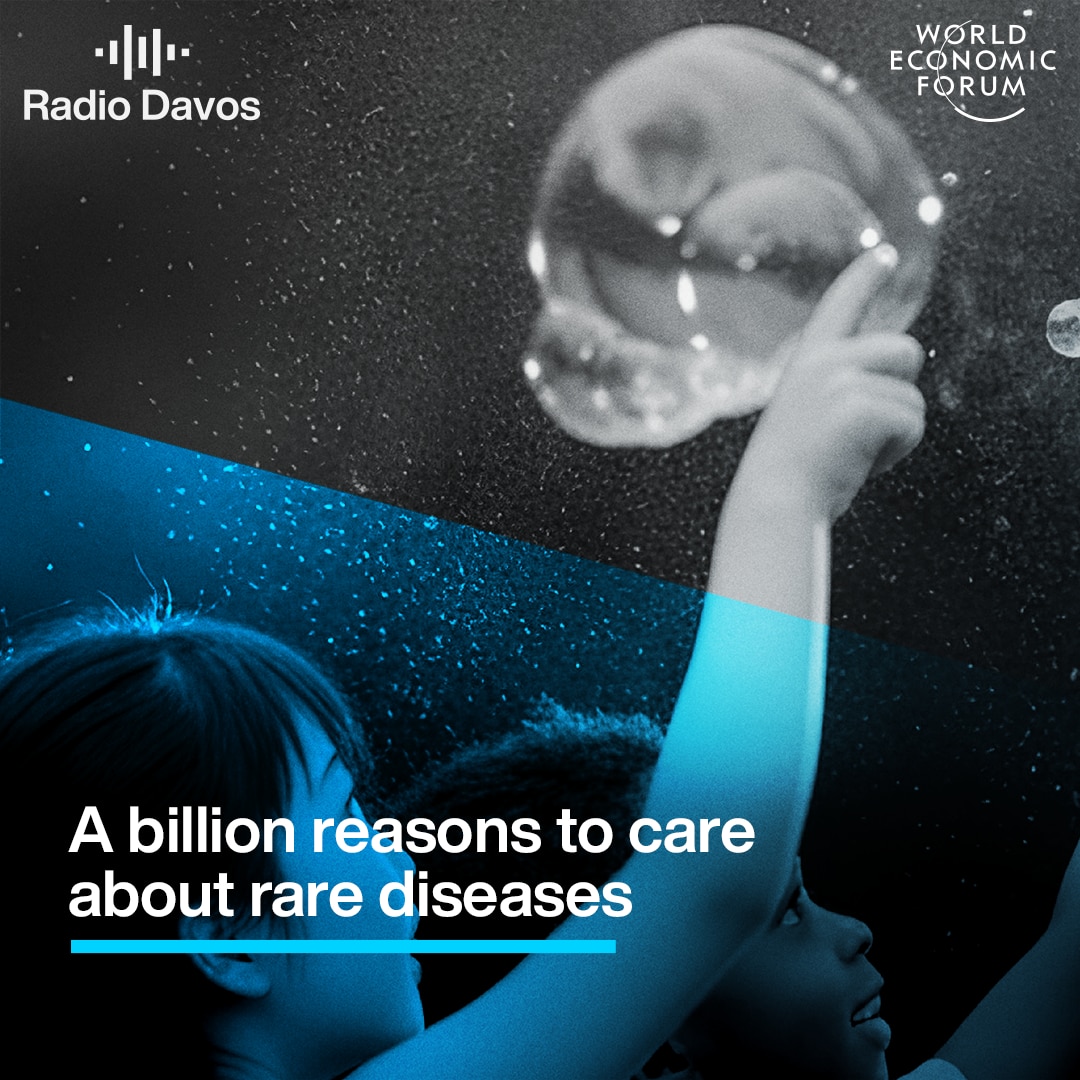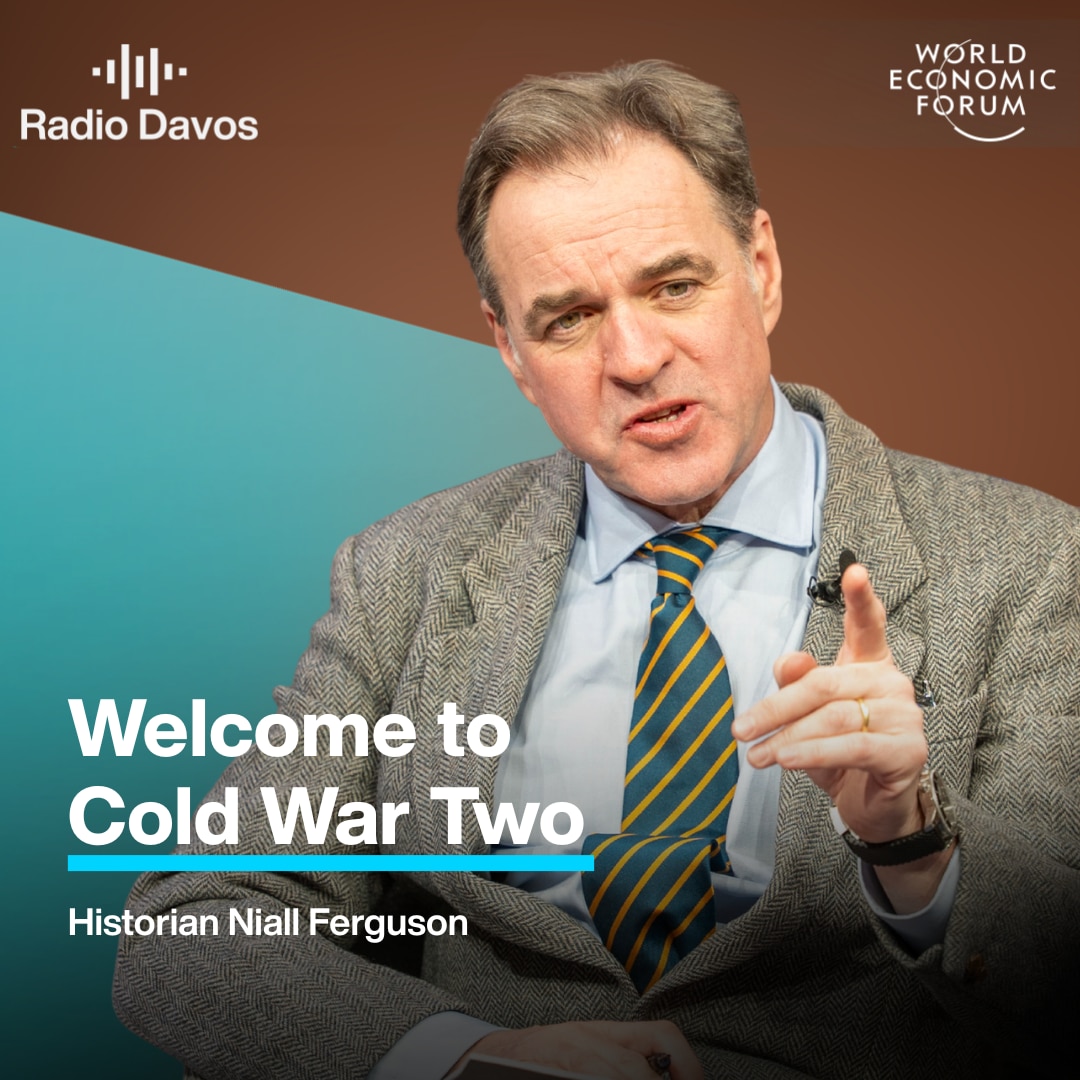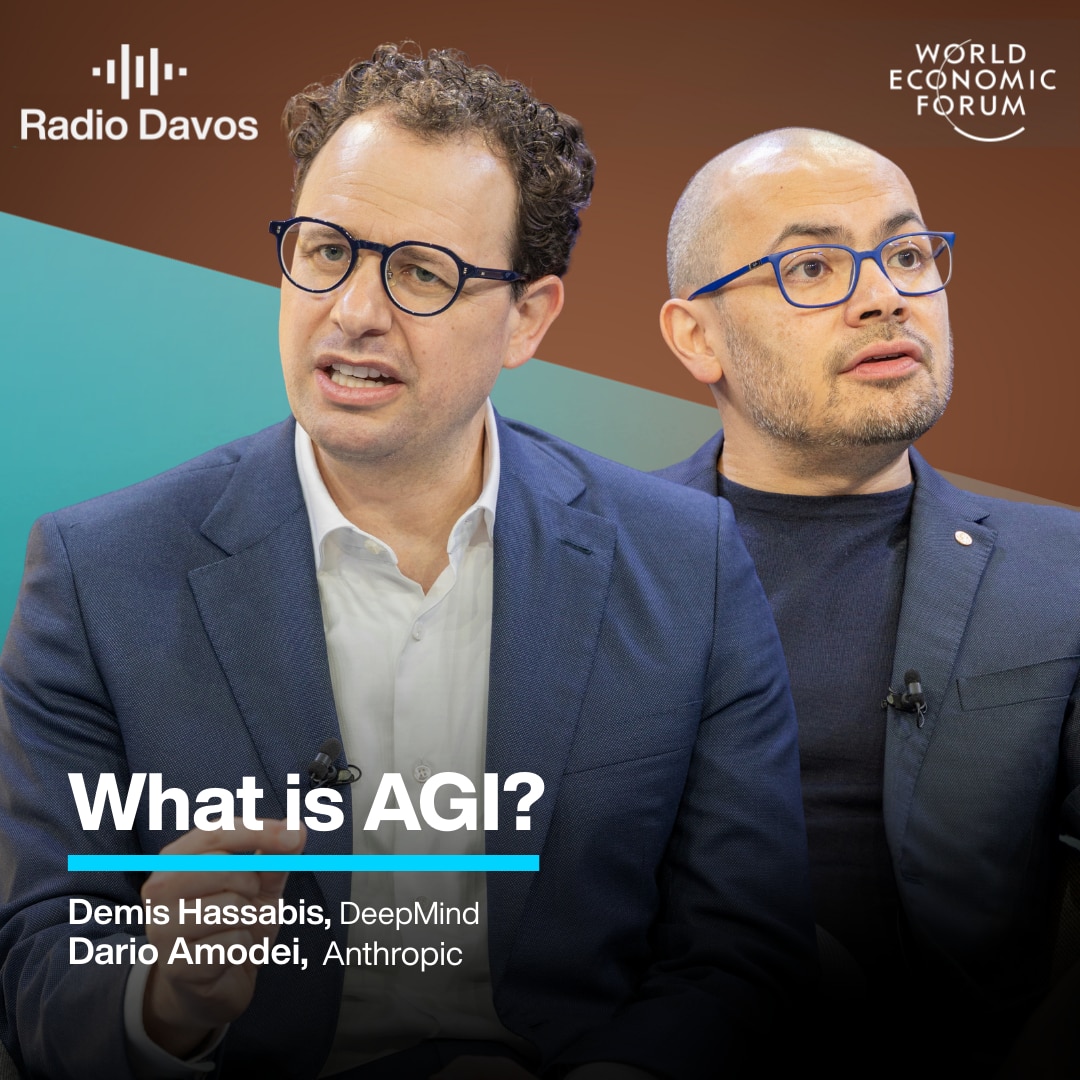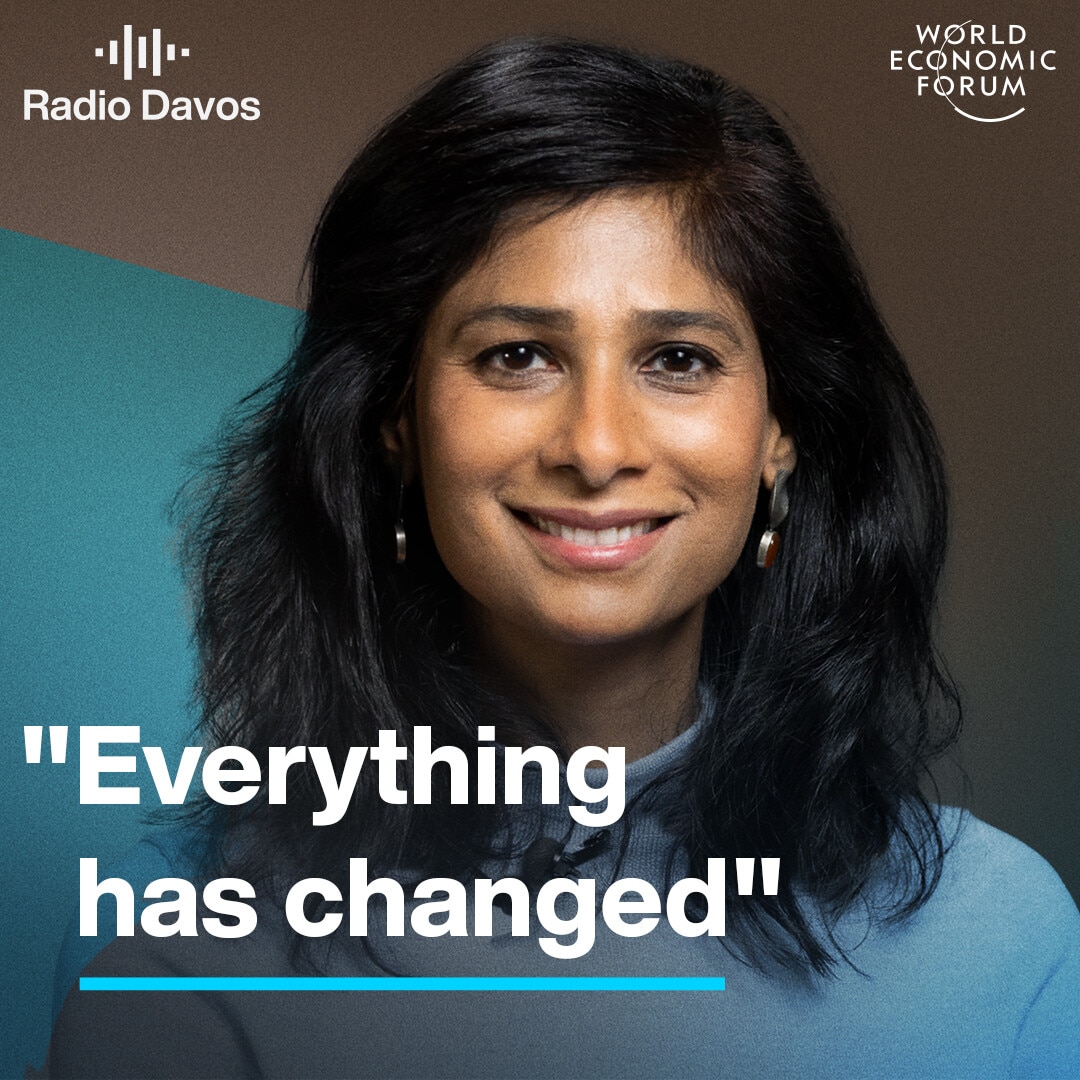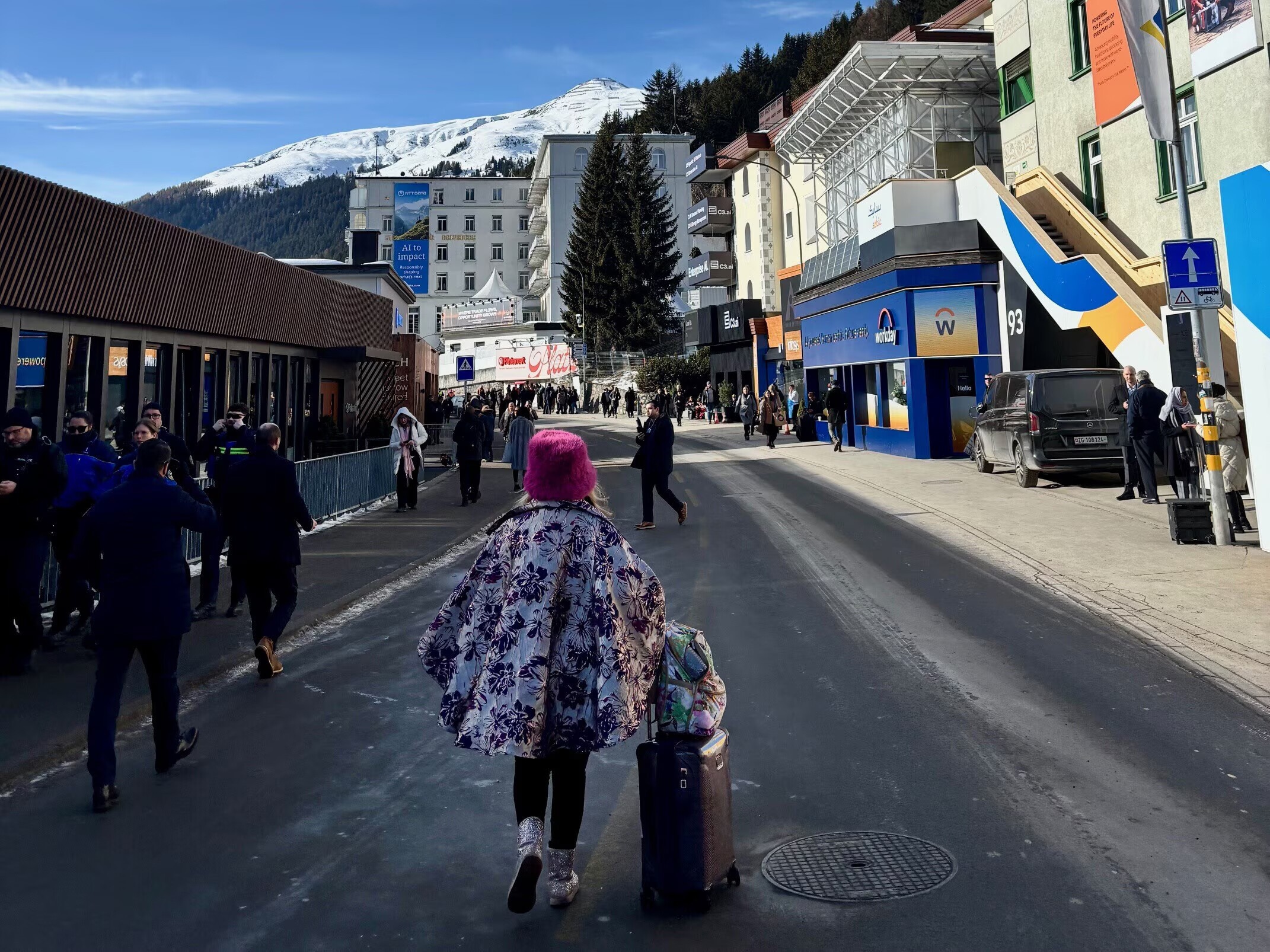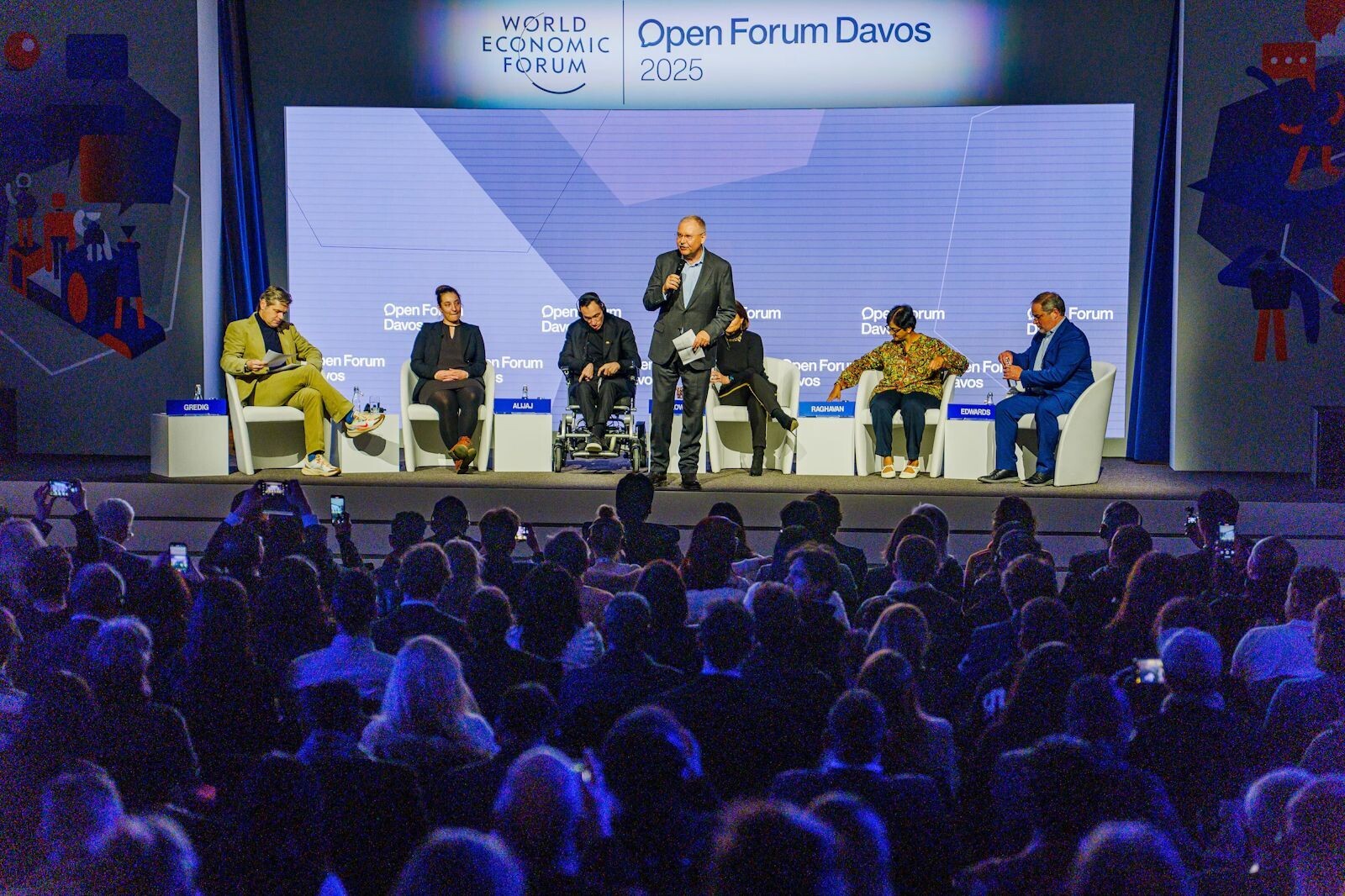Davos 2023 Day 3: global collaboration in the metaverse
ポッドキャスト・トランスクリプト
This transcript has been generated using speech recognition software and may contain errors. Please check its accuracy against the audio.
Robin Pomeroy [00:00:01] It's Wednesday, the 18th of January, and from the World Economic Forum's Annual Meeting 2023, this is Radio Davos.
Alan Jope, CEO, Unilever: [00:00:08] The panellists are suggesting we may be past peak inflation. I think that's right. We are certainly nowhere close to peak prices.
Robin Pomeroy [00:00:15] Yes, the global economy faces big headwinds. We get a flavour of the discussions with the boss of Unilever, a top IMF economist and Germany's finance minister. And we welcome you to the Radio Davos booth, someone who's had a view of the earth that most of us can only dream of.
Matthias Maurer, Astronaut, European Space Agency: [00:00:28] And from this vantage point, looking down to planet Earth, everything that you learned before, that your brain understands, suddenly your heart also understands.
Robin Pomeroy [00:00:37] Come with me as I get a tour of the forum's Metaverse, the Global Collaboration Village floating around in a hot air balloon quite high above the ocean, looking out over there. I'll try to jump off. Oh, it would.
Speaker 4 [00:00:49] I'm glad you did.
Robin Pomeroy [00:00:50] All. We hear from the creators of the Global Collaboration Village and from the leaders of the companies helping the forum build this virtual world, Microsoft and Accenture.
Heba Aly [00:00:59] The killer app is really the different ways to collaborate. And you see that with the Global Collaboration Village.
Robin Pomeroy [00:01:06] Idris Elba has his say at Davos 2023.
Idris Elba, Actor & Campaigner: [00:01:09] With greater access to finance, to markets, to resources, to technology, to knowledge and to people, we can define a different future.
Robin Pomeroy [00:01:21] For daily coverage of Davos 2023, subscribe to Radio Davos wherever you get your podcasts or find us at wef.ch/podcasts and follow the action live here live and on catch up at wef.ch/wef23 and across social media using the hashtag #wef23. I'm Robin Pomeroy at the World Economic Forum and with daily coverage of Davos 2023.
Idris Elba [00:01:40] Please do not lose courage.
Robin Pomeroy [00:01:43] This is Radio Davos. Welcome to Radio Davos and welcome to Davos. This podcast is coming to you every day from the heart of the World Economic Forum's Annual Meeting. And each day I'm joined by different co-hosts from the world of podcasting. And I'm delighted to welcome today's co-host, Heba Aly, host of Rethinking Humanitarianism. Hi Heba how are you?
Heba Aly [00:02:06] Hi, Robin. I'm good, thanks.
Robin Pomeroy [00:02:07] So delighted to have you here. Now, your podcast is the one people need to listen to in the English language if they want to know about the humanitarian sector. It's a wide, interesting, misunderstood sector. I mean, what is the podcast about? How would you describe it to someone?
Heba Aly [00:02:23] I would describe it and it very much parallels with what we see here at Davos and the reason for the discussions here at Davos, that we live in a world in which humanitarian needs, and by that I mean access to food, to safety, to shelter, the basics of life, are rising exponentially because of crises that are happening across multiple fronts. And you know it well, the term, the polycrisis, all of these different crises that are intersecting. And so we've reached a point in which the traditional ways that the humanitarian response sector used to operate in order to help people are not enough to meet these massive, massive needs. So we look at how can you do humanitarianism better if you want to help people in need? Where do the most ethical, most accountable, most efficient, most effective ways of doing that in this modern world that we're living in?
Robin Pomeroy [00:03:14] Why is it important to be at Davos? We were chatting just before we started recording that some people say, “huh, why are you going to Davos?”
Heba Aly [00:03:21] Yeah, and I get that question from my own team. And, you know, every year there's a slew of articles about the Davos man being out of touch with reality. Well, first of all, as journalists, I think we need to speak to everyone and particularly those who have power, that you can be holding them to account, asking them the right questions. But more broadly, I think, you know, there's a lot of scepticism around the role of civil society at Davos being a form of greenwashing. And I think if you've got a seat at the table, it's up to you to use that and make it meaningful and in particular that, you know, many of the problems the world is facing today will not be solved by the UN, by NGOs working in their silo. They need to engage a much broader group of people as stakeholders, as everyone likes to call them here. The private sector has to be part of the solution. As we've often heard, a lot of the people that are causing the problem are here at Davos, and if you don't engage them, you're not going to make traction. So that's what brings me.
Robin Pomeroy [00:04:17] So we're talking humanitarianism. I guess related to that was the Crystal Awards on day one this week, which kind of kicked off the whole Davos 2023. And Idris Elba and his wife, Sabrina, were awarded a Crystal Award. That's an award that goes to people in the kind of cultural sector that are having a bigger impact on the wider world, making the world a better place, if you will. Let's hear a bit from that ceremony. Idris Elba and his wife, Sabrina.
Sabrina Elba, Actor & Campaigner: [00:04:43] Somalia, my home country is on the brink of famine. Millions of Yemeni children are acutely malnourished. Afghanistan, Central African Republic, DRC, Haiti, Sudan, South Sudan all face catastrophic levels of hunger. Hundreds of millions of people are being forced to flee their homes because of conflict, because of climate change. In some cases, both.
Idris Elba [00:05:09] What Sabrina and I would like to leave with you today is please do not lose courage. It takes stamina to take to stay the course to the businesses, keep investing in mitigating climate change. As Sabrina said, please invest in small farms and the small to medium businesses that support. With greater access to finance, to markets, to resources, to technology, to knowledge and to people, we can define a different future. Thank you so much.
Robin Pomeroy [00:05:48] Idris Elba, a bit of starpower in Davos, always a good thing. What do you feel about celebrities becoming- he's a goodwill ambassador for the International Fund for Agricultural Development, which is a UN agency. A useful thing?
Heba Aly [00:06:02] I read some very interesting research years ago about celebrity ambassadors, and it was very fascinating to see that actually they don't have that much influence in changing the public opinion about these issues. So someone will follow Angelina Jolie because she's Angelina Jolie. But the fact that she goes to visit people in Yemen doesn't make them suddenly care about Yemen. What it does do, however, is bring attention to those issues in the kind of political elite, interestingly enough. So I think there is really never any harm in bringing more awareness to these issues through the channels of celebrity. There's a whole lot of depth and nuance that needs to then follow if you really want to understand these issues and actively participate in solving the problem. But I mean, in a world where people's attention is pulled in so many different directions, to have celebrities helping those of us who are in the trenches trying to raise awareness about crises in that fight, I think can only be a good thing.
Robin Pomeroy [00:07:02] Let's play you another clip from yesterday, Heba. I'm really interested in what's happening at Davos, where you've got these big issues which sometimes can be seen as silos. So, you might see the humanitarian sector, but then you might see economic growth or the economic crisis, the cost-of-living crises, climate change, the energy crisis. But all these things are interlinked, aren't they? I'm going to come back and I'll ask you a question to that after we've heard a very short clip from the head of the International Energy Agency, Fatih Birol.
Fatih Birol, Executive Director, International Energy Agency: [00:07:33] Biggest driver of renewable energy growth today is energy security. Renewables are pushed very strongly because mainly for energy security reasons. So home-grown renewables are the energy of peace.
Robin Pomeroy [00:07:52] Fatih Birol of the International Energy Agency talking about the importance of renewable energies not just for climate change but also for energy security and in fact for peace, he said. How much does the humanitarian sector talk about and work on climate change?
Heba Aly [00:08:08] Oh, every day they are dealing with the implications of climate change. They're dealing with flooding, they're dealing with drought, they're dealing with hunger. They're all linked to climate change. So, it has become in many ways their core business. And it's true that a lot of humanitarians were kind of grappling with what is their role in this massive, massive problem, given that they are on the kind of tail end of the problem. But more and more you're seeing humanitarians advocating with other sectors to mitigate the impacts of climate change and to invest more resources into adaptation, particularly in those countries that are hardest hit. So, you can't separate the two anymore.
Robin Pomeroy [00:08:52] One of the things you're doing here in Davos is moderating a session or sessions. I think you did one yesterday, Heba?
Heba Aly [00:08:58] Yes, it was about disruption in the humanitarian sector and linked to what I was saying earlier about rising needs and needing to find new ways of working. It was really a discussion about some new players in the space, a company called GiveDirectly, the Stellar Development Foundation that's using blockchain to get cash into people in need in Ukraine, working with the U.N. refugee agency and Jose Andres, the chef, his organization called World Central Kitchen. Basically, new players that are entering what used to be a very traditionally government- and UN-dominated space, saying, actually, we also have a role to play and in some cases we might be able to do it better than you. So I find that fascinating because it really speaks to one of the ways in which Davos can be quite useful for the humanitarian sector, which is unpacking the role of the private sector in solving or responding to some of these crises with technology and at a scale and with financing, frankly, that traditional aid can't necessarily do. There are all kinds of challenges with that, but it's a necessary conversation.
Robin Pomeroy [00:10:02] Rethink Humanitarianism is such a good podcast. I think it kind of shows how there’s a cutting edge, things are changing all the time in that field. I think your latest episode you're talking to science fiction writers about reimagining the future. I mean, if people haven't heard the podcast, is probably not what they might expect from it.
Heba Aly [00:10:21] Yeah, it was a little bit off the beaten path for us, but this season in particular, we're looking at reimagining global governance. So what would a more equitable world look like and what would it take? So things like can you reform the UN Security Council to give power more equally across countries? What would more just climate financing look like? It's the war in Ukraine. It's COVID. It's the cost-of-living crisis. But these are all crises that affect the West. And what we try to do at the New Humanitarian is to take a more universal lens and look at crises and suffering across the board. And there are a number that are very neglected that aren't talked about in the halls of Davos because they're not geopolitically relevant. And that's a gap I think we should continually try to fill.
Robin Pomeroy [00:11:01] Well, Heba Aly, host of Rethinking Humanitarianism podcast, thanks so much for joining us on Radio Davos.
Heba Aly [00:11:06] That was my pleasure.
Robin Pomeroy [00:11:09] Welcome to Radio Davos, Olivier Schwab. How are you?
Olivier Schwab, Head of Technology, World Economic Forum: [00:11:12] Very well, thank you Robin.
Robin Pomeroy [00:11:13] Now, you're a member of the managing board at the World Economic Forum, and there's a session today stewarding responsible capitalism. What do you mean by that? And can you give us some of the background as to what that actually is.
Olivier Schwab [00:11:27] At a very basic level it is that companies should have a civic responsibility, right? They're part of society and therefore should be accountable towards not just their shareholders but the communities within which they operate. Their employees, they should treat their employees fairly and so on right. And so that's what we mean by responsible capitalism.
Robin Pomeroy [00:11:51] So this is the famous stakeholder capitalism, which is a phrase often talked about at the World Economic Forum and with the partner companies. It's been taken on board by a lot of companies around the world, whereas a generation or two ago, the role of a company was to make profit for its shareholders. That's still the role of a company, but many companies have taken on board this idea that they also have to take care of the environment and take care of the other stakeholders, the people who work in the company. I mean, where do you see that debate now? Because also there's been a bit of a backlash, hasn't there, in some parts of the world. Is it accepted now? Is the pendulum swinging back away from it?
Olivier Schwab [00:12:35] This whole space, if you will, has evolved extremely rapidly over the past three years. We ran a survey about three years ago where clearly CEOs started to feel the pressure from society on the one hand, but from their investors as well for providing them with more information on non-financial metrics, non-financial data. Right. And so, what was happening, you had a bit of a movement, societal movement, but also from the investor side. And you remember the Business Roundtable's declaration, I think it was 2019, right around the time where we started working on a set of common metrics as well. So, what's happened is you had over the years a certain number of standard setters, we call them, who developed a different set of metrics which companies could use to report on these standards. And it became quite a fragmented and cumbersome space. And this is when our partners approached us and said, Look, could the World Economic Forum work with us and provide some kind of a common denominator? Right, some kind of a baseline. And that's what we've been working on for the past three years.
Robin Pomeroy [00:13:48] Because it's easy for a company to say, I treat the environment well, I treat my people well. You can make all kinds of claims, but if it's not backed up, then who knows if it's true or not. With metrics, with these stakeholder metrics, they should be able to say, just as they can say, our revenue has been this much, etc. They can say this is our emissions of greenhouse gases and this is where we're bringing them down too. There'll be actual proven auditable data.
Olivier Schwab [00:14:16] Indeed, the metrics need to be comparable and they need to be practical and pragmatic for businesses, right? And the reality is a lot of businesses are already reporting in some way, shape or form, but we need some kind of a common denominator. And so, we developed the stakeholder metrics of the World Economic Forum. We didn't reinvent the wheel. What we did is we scanned the landscape and basically created a set of metrics which we believe are, as I said, practical and pragmatic for businesses and can serve as an onramp. Now that regulation is kind of catching up, different regulatory environments are starting to demand from companies that they indeed report.
Robin Pomeroy [00:15:00] If people are looking at today for this session, it's called Stewarding Responsible Capitalism. You’re going to learn more about the state of play of this process.
Olivier Schwab [00:15:11] Now, exactly as I said, this environment is rapidly evolving, with different jurisdictions having frameworks under review, if you will. It's important for companies to understand where we're heading there so that they can they can prepare themselves.
Robin Pomeroy [00:15:27] Great, we, look out for that. People can watch that live. It's live streamed as so many of the sessions are, and it will remain there for people to watch on catch up. Olivier Schwab, thanks for joining us on Radio Davos.
Olivier Schwab [00:15:39] Thank you.
Robin Pomeroy [00:15:40] To talk about climate change I'm joined now by Gill Einhorn, who's Head of Innovation and Transformation on Climate and Nature in the Centre for Nature and Climate at the World Economic Forum. Hi, Gill, how are you?
Gill Einhorn, Head of Innovation and Transformation on Climate, World Economic Forum: [00:15:51] Hi, Robin. Very well thanks and you?
Robin Pomeroy [00:15:53] Very well, thank you. Now, climate change just the biggest issue all the time. There's a very big session happening today on that. Why don't you tell us what's going to happen there?
Gill Einhorn [00:16:03] Thanks, Robin. Perhaps just as context, we have a programme of over 150 nature and climate related sessions in Davos this year, which is our largest and most substantive programme to date. Our biggest session is coming up today called Leading the Charge through Earth's New Normal at 2 p.m. The session is unique because we'll be bringing together moments that connect the head and the heart to help propel action on this urgent agenda. We will kick off with Johann Rockström and Joyeeta Gupta, two world renowned academics who will be previewing soon to be published, never seen before science, which proposes clear new boundaries similar to the Paris Agreement’s 1.5 degree limit for climate for several interconnected global commons, climate, the biosphere, freshwater fertilisers and aerosol pollutants.
Robin Pomeroy [00:16:57] That's a really interesting, that kind of interlinked nature because I think until fairly recently people saw climate change as particularly an energy issue and it was reaching the biodiversity summit I think the links between climate change and nature, both in terms of nature suffering from climate change but also of nature being able to provide a lot of the potential solutions. This science that you're talking about will look out at these other areas, right?
Gill Einhorn [00:17:24] Absolutely. This is looking at moving beyond just a single target for climate to understand what do safe operating systems look like across all of the tipping points that we are faced with on the planet today. And the scientists have developed the biosphere, fresh water, fertiliser and aerosol pollutants as new areas that they haven't yet given particular boundaries to and will be presenting in Davos today. The other angle to this, which also is new, is that these new boundaries account not just for the Earth system impacts, but also human wellbeing and justice. And it's the first time that justice has been factored into an assessment of the state of the planet and represents a quantum leap in our ability to understand Earth's capacity to sustain life and for the role we humans play as guardians for our only home and each other.
Robin Pomeroy [00:18:23] So you've mentioned the scientists who are in that session. Do you have anyone else there too?
Gill Einhorn [00:18:28] Yes. So will go into a panel discussion with the new president of Colombia, with Marc Benioff of Salesforce, Fawn Sharp, an indigenous leader, with Roshni Malhotra from HCL, and Vice President Al Gore to talk about visionary leadership needed that connects the worlds of business, policy and indigenous peoples and local communities and responds to what they've heard from the scientists at the beginning of the session. And then we'll conclude with a performance by world renowned cellist Yo-Yo Ma, incorporating exclusive footage from the Our Planet series courtesy of Netflix.
Robin Pomeroy [00:19:05] Great, so that's the heart you were talking about earlier?
Gill Einhorn [00:19:07] Absolutely.
Robin Pomeroy [00:19:08] The scientists with the heads and the politicians with the head or heart. And then then the musician. This sounds like an amazing session. I'll look out for this.
Gill Einhorn [00:19:17] And I think that this is going to be a session which is really a clarion call for action for every company, every city and every country, to urgently evolve their environmental and social goals in the face of worsening inequality, destruction of ecosystems, and fast approaching climate tipping points. So, it's a really comprehensive and holistic perspective that we'll be bringing and one which will filter into all of the other sessions that we're running on nature and climate.
Robin Pomeroy [00:19:46] Well, as you say, there's 150 or something sessions on climate change.
Gill Einhorn [00:19:51] On nature and climate.
Robin Pomeroy [00:19:52] That's the nature and climate. So people can look out for those on our website. They can look out for this one, you can follow that live or on catch up. Also, you mentioned indigenous leaders. Now, I know you produced a report last week about this. Could you tell us something about that and where people can find out more?
Gill Einhorn [00:20:08] Sure. Indigenous peoples and local community land cover a third of Earth's territories. And what's quite remarkable is that 91% of them are in good or fair ecological condition today, which is a testament to the effectiveness of long term indigenous stewardship in managing complex natural environments. And last week, as you mentioned, we launched a new report called Embedding Indigenous Knowledge in the Conservation and Restoration of Landscapes. This is the first time we've written report in collaboration with an author who is indigenous on educating corporate and philanthropic investors on how to embed traditional ecological knowledge and empower indigenous peoples in the conservation and restoration of ecosystems worldwide.
Robin Pomeroy [00:20:56] Well, people can find that online as well. Gill, good luck with everything today and the rest of the week. Thanks for joining us on Radio Davos.
Gill Einhorn [00:21:03] Thanks so much. Good luck to you and thank you all for who are listening for your support to this agenda.
Robin Pomeroy [00:21:09] Thanks, Gill.
Robin Pomeroy: The global economy remains a huge issue here in Davos. There are many sessions dedicated to it. Here's a flavour of one of them yesterday, it was called Stemming the Cost of Living Crisis. A really interesting session which you can watch back on or indeed listen to as a podcast. It's going out as an Agenda Dialogue. It's one of our sister podcasts. Please look for that wherever you get your podcasts. But let's hear a flavour of it. This is Unilever Chief Executive Alan Jope having this to say about inflation.
Alan Jope, Chief Executive Officer, Unilever: I think the panellists are suggesting we may be past peak inflation. I think that's right. We are certainly nowhere close to peak prices. So the consumer is going to see the cost of food, personal care products, everyday commodities,is going to continue to rise. And I think the the most households, particularly in Europe, are going to feel the squeeze.
Robin Pomeroy: This is the economist Gita Gopinath, First Deputy Managing Director, International Monetary Fund.
Gita Gopinath, First Deputy Managing Director, International Monetary Fund: So in terms of, you know, the point you raised about, has inflation peaked? We do believe that in terms of headline inflation for the global economy, we think it peaked in '22 and it's likely to keep coming down. But if you look at the more stickier components of inflation, which is services sector inflation, for instance, I think there's more stubbornness in there. And that's going to be a challenge for central bankers.
Robin Pomeroy: And on the same panel, German Finance Minister Christian Lindner said some economies now have to make some pretty fundamental changes.
Christian Lindner, Germany’s Federal Minister of Finance: German business model for too long time based on very cheap energy imports. And this is why we could afford a higher level of taxation, for example. And now we have to reinvent our business model. And my expectation is higher competitiveness for the German private sector will lead to the ability to pay higher wages, to reduce the burden for the private households.
Robin Pomeroy: Throughout the week here in Davos, some of the biggest world leaders are speaking. You can catch up with them on the website. Volodymyr Zelenskyy president of Ukraine is speaking via video link and his wife, Olena Zelenska, made the trip to Davos to speak in person. Here's a little bit of that.
Olena Zelenska, First Lady of Ukraine: [00:21:25] We are facing a threat of a collapse of the world as we know it, the way that we are accustomed to it, or to do what we aspire. What can be life in a world where tanks are allowed to strike at nuclear power stations? What will happen to inflation when state borders start to collapse and the integrity of countries will be trampled on by those who want it. What will happen to the cost of living when millions, not millions, but tens of millions of people, will be forced to flee a mass starvation and will become refugees? How does the world want to achieve climate neutrality if so far, it hasn't even stopped the burning of entire cities in Ukraine. This is what Russia is doing with its artillery, with its missiles, with its Iranian drones. And you know that the Russian aggression was never intended to restrict itself to the Ukrainian borders. This war can go further and make the crisis wider if the aggressor does not lose. In other words, if the sum of our influence does not outweigh the aggression.
Robin Pomeroy [00:22:39] Olena Zelenska, the First Lady of Ukraine, speaking through an interpreter in the Congress Hall in Davos yesterday. And across the hall from where that was happening, in the Radio Davos booth we met an astronaut, Matthias Maurer, who has appeared already at Radio Davos in the past speaking from the International Space Station, he came into the booth for an interview with Linda Lacina and we'll put it out in the near future as a Meet the Leader. This is much is Matthias Maurer.
Matthias Maurer, Astronaut, European Space Agency: [00:22:59] So my name is Matthias Maurer, and I'm a European astronaut. That was basically my dream. I was preparing for many, many years to fly to space. Last year it actually materialised and I spent 177 days in space. Every 90 minutes we fly around the planet Earth so 16 times a day we see sunrise, sunset. And from this vantage point, looking down to planet Earth, everything that you learned before that your brain understands, suddenly your heart also understands. You see the beauty of our planet, but you also see the problems that we have to face on our planet.
Robin Pomeroy [00:23:37] When I arrived in Davos earlier this week, I was lucky enough to get a sneak peek at what is being called the Global Collaboration Village. It's the World Economic Forum's grand leap into the Metaverse, a space being built in collaboration with Accenture and Microsoft. Donning a headset and holding controllers in each hand, I went on a tour of the virtual realm that parts of it, anyway, looked a lot like Davos. I flew high above the ocean in a hot air balloon and swam through the sea to plant mangrove seedlings. Delegates in Davos this year are going on a similar eye-opening tour of the space that, like the Davos meeting itself, will provide immersive spaces where companies, governments, academics and civil society can convene to discuss and take action on the world's most pressing challenges. All that without actually physically needing to be in the same space. If you're lucky enough to secure a place on one of the tours, then I'm sure you'll enjoy it. If not, here's a flavour of what to expect.
Elisabeth Papadopoulos, Accenture Metaverse Continuum Business Group: [00:24:27] One, two, three, four, five, six, seven. Oh, well. Full house. Perfect.
Mark Curtis, Co-lead, Accenture Metaverse Continuum Business Group: [00:24:34] Hello, I'm Mark. I'm from Accenture. And as you know, we're partnering with the Forum and with Microsoft to create this. I lead on the Group at Accenture. And you're going to see quite a lot in the experience about how good the metaverse is at showing both macro and then going back to micro detail.
Elisabeth Papadopoulos [00:24:50] The village is a purpose driven metaverse. It's a virtual platform that gathers diverse stakeholders to collaborate, to address real problems and create impact for good. So today you're going to experience about 20 minutes in VR.
Hi there. My name is Elisabeth Papadopoulos, and I have had the great fortune of working with Accenture on the Global Collaboration Village as a creative director.
Robin Pomeroy [00:25:13] So I've just been in the Global Collaboration village. I've been bobbing around in the sea and in a hot air balloon. I mean, in a nutshell, it's an amazing looking place, amazing sounding place. But what is its practical application?
Elisabeth Papadopoulos [00:25:28] Honestly, it's about impact. You know, I think our hope and our expectation is that because it is visually potent, because it has a soundscape that is compelling, what it allows us to do is to get collaborators to participate. We invite them into causes, into ideas. We materialise those causes and concepts in a form that is participatory. And when we are able to bring someone into a participatory experience, all of a sudden they've taken part in an idea. That helps us to win hearts and minds for causes which all of a sudden makes it a little bit less of a leap to win other for forms of investment, whether that is financial or policy investment.
Robin Pomeroy [00:26:16] Right. So, I guess the example that you showed us today was the planting of a.
Elisabeth Papadopoulos [00:26:23] Mangrove sapling.
Robin Pomeroy [00:26:24] Mangrove sapling, exactly, which suddenly miraculously sprouted out in this enormous forest.
Elisabeth Papadopoulos [00:26:30] It did. It sprouted into a forest. And in so doing, it made some significant changes to the environment. In that coastal ecosystem by taking part, by planting a mangrove sapling in the Global Collaboration Village, you were able to witness the impact of your action. In this case, it's about understanding that mangroves help restore health to an ecosystem, creating more homes for the sea life that lives nearby, but also has a meaningful impact on humans because by planting those roots, we literally prevent coastal erosion in some of our most fragile coastlines. The Global Collaboration Village is about bringing us as humans to parts of our world that we might not otherwise be able to encounter. Having us confront challenges directly that we might not otherwise face. And then also extending that reach out eventually as the technology evolves, allowing us to reach more and more people, bringing more and more folks from outside of Davos into the conversation to participate very actively.
Robin Pomeroy [00:27:32] On the tour. We were led into the metaverse by Jacqui Eisenberg, head of content curation at the Global Collaboration Village, and by Mike Curtis, co-lead of Accenture Metaverse Continuum Business Group, who briefed us before we dive in.
Mike Curtis [00:27:44] And then we're going to go and really spend time in the ocean. We're going to hover above the ocean. We're going to go onto the surface, then we're going to deep dive and go under.
Robin Pomeroy [00:27:53] The Global Collaboration Village is a virtual world where I floated around. The Avatars don't yet have legs, but I could move around, walk up to other people on the tour and talk to them. And we were transported to a hot air balloon flying high above the ocean. We were plunged into the water to see coral reefs and watched as a humpback whale pass by. In another part of the Global Collaboration Village, we saw how companies, governments or other organizations could create pavilions for meetings. The village even has a performance stage where the sound changes as you move around the room. I spoke to Nadia Botello audio lead at Accenture Metaverse Continuum Business Group, who created the Global Collaboration Village's impressive soundscape.
Nadia Botello, Audio Lead, Accenture Metaverse Continuum Business Group: [00:28:32] Every different scene and world has accurate flora and fauna to that location in the world, to the season and to the time of the day of the scene. So, there's a scene set in the Alps and it's the morning and it's the winter. So, you hear the birds that are accurate to that moment and there's an island and that's set in Indonesia and you hear the birds that are accurate to them as well. I feel like for extended reality experiences ambisonic audio is incredibly important because the experience-
Robin Pomeroy [00:29:22] Ambisonic?
Nadia Botello [00:29:22] Ambisonic, so full surround sound, so the experience moves with you instead of you just hear mono or you hear stereo audio. For example, when you were underwater, if you looked up, you would have heard the waves going overhead. If you go next to the kelp, you'll hear the slight movement of that.
Robin Pomeroy [00:29:46] Back out of the metaverse and in the real Davos, we heard from three people driving the construction of the Global Collaboration Village. Microsoft President Brad Smith, who talks about the software and hardware of the metaverse. Before him, Julie Sweet, Chair and Chief Executive Officer of Accenture, and what she sees as the killer app of the Metaverse technology. And first, Klaus Schwab, founder and executive chairman of the World Economic Forum.
Klaus Schwab, Founder & Executive Chairman, World Economic Forum: [00:30:11] The Global Collaboration Village is the pioneering effort to use the metaverse for public good, to create global cooperation and to strengthen global cooperation in the metaverse or using metaverse technologies. For me, it's a dream coming true because the village allows the Forum to create a more larger and open platform where everybody can participate. So, the idea is to bring all the stakeholders, governments, business, civil society together on a continued, sustained basis to supplement what we are doing here in Davos.
Julie Sweet, Chair and Chief Executive Officer, Accenture: [00:30:59] The killer app is really the different ways to collaborate, and you see that with the Global Collaboration Village. One of the most remarkable things at the beginning of this work was how our colleagues from the World Economic Forum, Microsoft and Accenture, never got in a room together, never flew to Davos and created this incredible metaverse and how we were going to actually run it entirely. In the metaverse.
Brad Smith, President, Microsoft: [00:31:27] We're creating at Microsoft through Microsoft Mesh, a software platform that will be accessible to people through a variety of different hardware devices, 3D devices that people obviously wear eyeglasses or goggles, but also two-dimensional devices like a laptop screen. And of course, the experience will not be identical. People who can participate in three dimensions will get a benefit. But all of this is about bringing something new and better, something that meets a human need to people in the broadest possible way.
Robin Pomeroy [00:32:06] Brad Smith of Microsoft ending our look at the Global Collaboration Village. We'll be hearing more about that in the months to come for daily coverage of Davos 2023. Subscribe to Radio Davos wherever you get your podcasts or visit wef.ch/podcasts and check out our sister podcasts, Meet the Leader and Agenda Dialogues, which are also releasing great episodes this week. And join the conversation on the World Economic Forum Podcast Club. Look for that on Facebook. Follow Davos 2023 live or on catch up at wef.ch/wef23 and across social media using the hashtag#wef23. This episode of Radio Davos is written by me. Robin Pomeroy. Editing was by Tez Kelleher. Studio Engineering was by Juan Toran. We'll be back tomorrow, day four. But for now thanks to you for listening and goodbye.
On Day 3 at Davos 2023, we enter the metaverse to experience the Forum’s Global Collaboration Village, hear why inflation may have peaked, but prices haven’t, and speak to astronaut Matthias Maurer. Heba Aly, of the podcast Rethinking Humanitarianism, co-hosts.
We hear from recipients of the Crystal Awards Idris and Sabrina Elba.
The boss of Unilever, a top IMF economist and Germany’s finance minister weigh in on the impact of inflation.
We welcome into the Radio Davos booth astronaut Matthias Maurer..
And we enter the metaverse to take a tour of the Global Collaboration Village.
People in this episode
Heba Aly, host of the podcast Rethinking Humanitarianism
Sabrina Elba, United Nations International Fund for Agricultural Development (IFAD) Goodwill Ambassador
Idris Elba, Entrepreneur, Actor, Musician, UN IFAD Goodwill Ambassador
Fatih Birol, Executive Director, International Energy Agency
Olivier Schwab, Managing Director, World Economic Forum
Gill Einhorn, Head of Innovation and Transformation, Centre for Nature and Climate at the World Economic Forum
Gita Gopinath, First Deputy Managing Director, International Monetary Fund
Christian Lindner, Germany’s Federal Minister of Finance
Olena Zelenska, First Lady of Ukraine
Jaci Eisenberg, Head of Content Curation at the Global Collaboration Village
Mark Curtis, co-lead, Accenture Metaverse continuum business group
Elisabeth Papadopoulos, Creative Director, Accenture Metaverse continuum business group
Nadia Botello, Audio Lead, Accenture Metaverse continuum business group
Klaus Schwab, Founder and Executive Chairman, World Economic Forum
Julie Sweet, Chair and Chief Executive Officer, Accenture
Brad Smith, Vice-Chair and President, Microsoft Corp
Sessions mentioned in the episode:
Subscribe on any platform: https://pod.link/1504682164
Join the World Economic Forum Podcast Club
Follow all the action from the World Economic Forum’s Annual Meeting 2023 at wef.ch/wef23 and across social media using the hashtag #WEF23.
Other links:
More podcasts from Davos 2023:
Check out Agenda Dialogues:
その他のエピソード:
「フォーラム・ストーリー」ニュースレター ウィークリー
世界の課題を読み解くインサイトと分析を、毎週配信。

